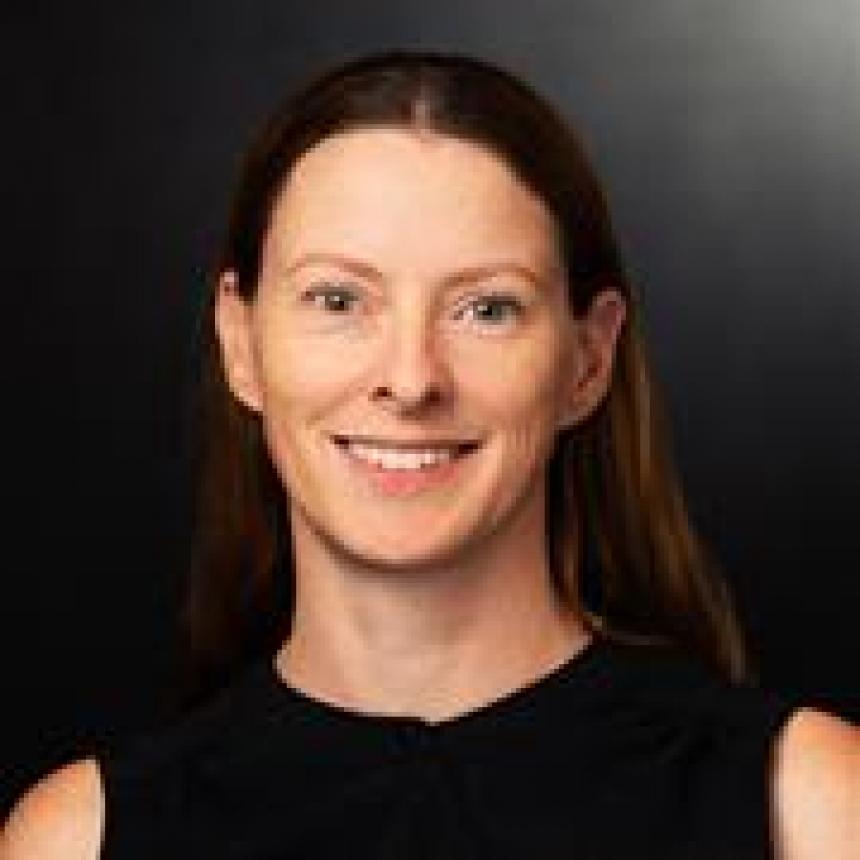
Professor Joanne Bowen
Professor
School of Biomedicine
Faculty of Health and Medical Sciences
Eligible to supervise Masters and PhD - email supervisor to discuss availability.
Professor Joanne Bowen
B.Hlth.Sci (Hons), PhD (Medicine), M.Phil (Clin Sci), Grad.Cert. Public Health, Grad. Cert. Online Learning
Prof Bowen's research focuses on mechanisms and management of cancer therapy-related toxicities, with a special interest in gastrointestinal adverse effects. She was awarded an NHMRC Australian-based Biomedical Training Fellowship (2009 – 2012) to conduct novel research aimed at discovery of peripheral blood biomarkers associated with risk of toxicity during treatment for oesophageal cancer. Her recent work has lead to development of preclinical models for testing interventions for gastrointestinal toxicity utilized by the pharmaceutical industry. She is co-head of the highly active Cancer Treatment Toxicities Group which supports diverse projects across the field of supportive oncology and training of the next generation of researchers.
- My Research
- Career
- Publications
- Grants and Funding
- Teaching
- Supervision
- Professional Activities
- Contact
As co-head of the Cancer Treatment & Toxicities Group (@ToxicitiesGroup for Twitter updates) in the School of Biomedicine, I am responsible for a program of research aimed at better managing side effects of cancer therapy. Our group investigates both the underlying mechanisms and the treatment approaches to prevention of some of the most common toxicities of cancer therapies including diarrhoea, vomiting, neuroinflammation and bone loss. My particular interest is in how the gastrointestinal tract responds to exposure to chemotherapy, radiation and small molecule inhibitors used in treatment of solid tumours, and how the microbiome can influence the incidence and severity of injury. My current projects focus on establishing new interventions for mitigation of gastrointestinal side effects that target interactions between the gut microbiome and immune system at the level of the mucosal barrier. Our group members include undergraduate students, through to Honours and PhD, as well as postdoctoral researchers. We conduct research projects using cell culture and organoid models, transgenic rodents, and in patient cohorts (detailed below). Our mission is to improve cancer outcomes through personalising treatment and supportive care.
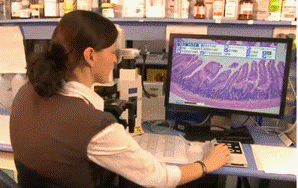
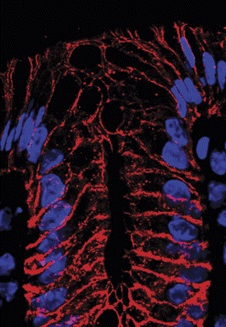
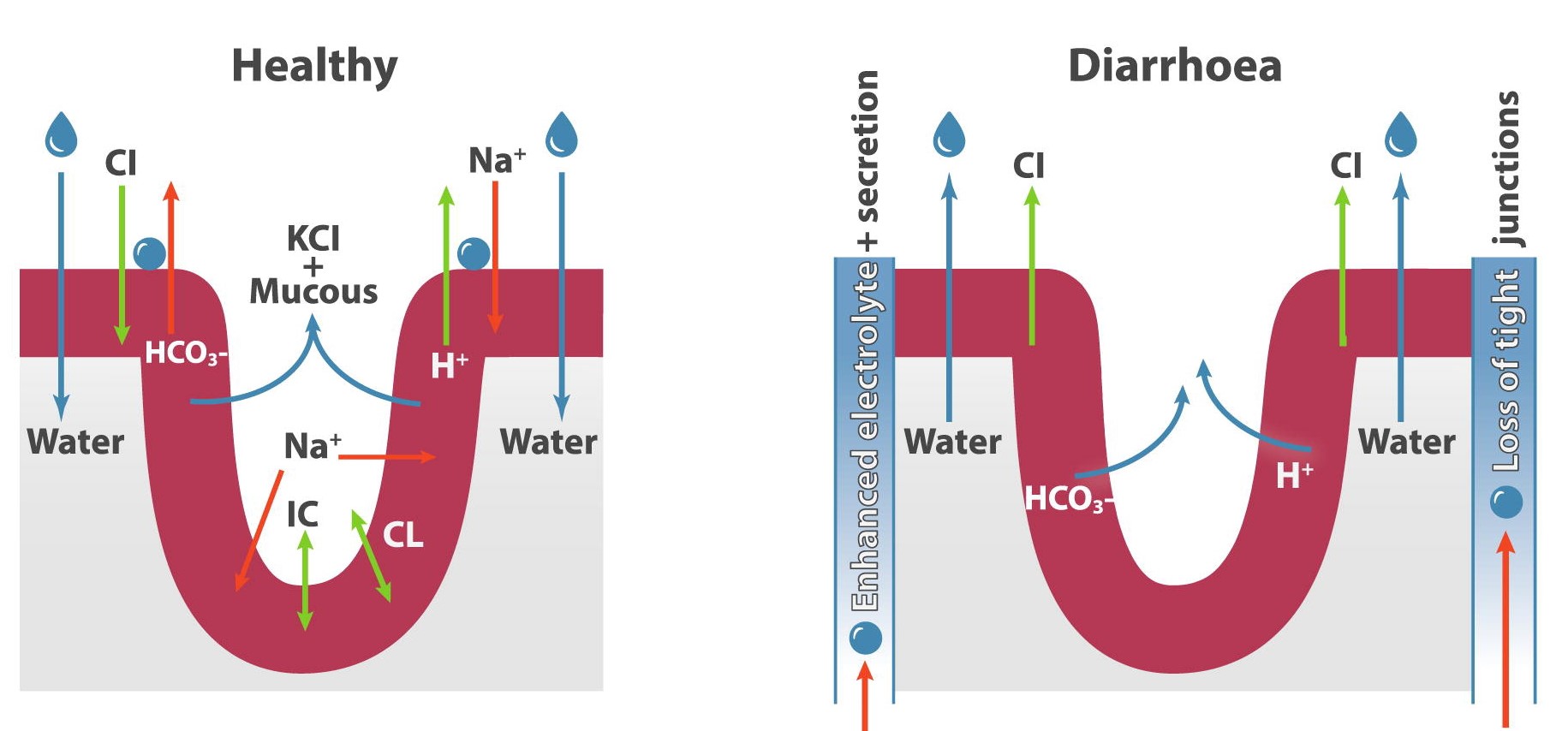
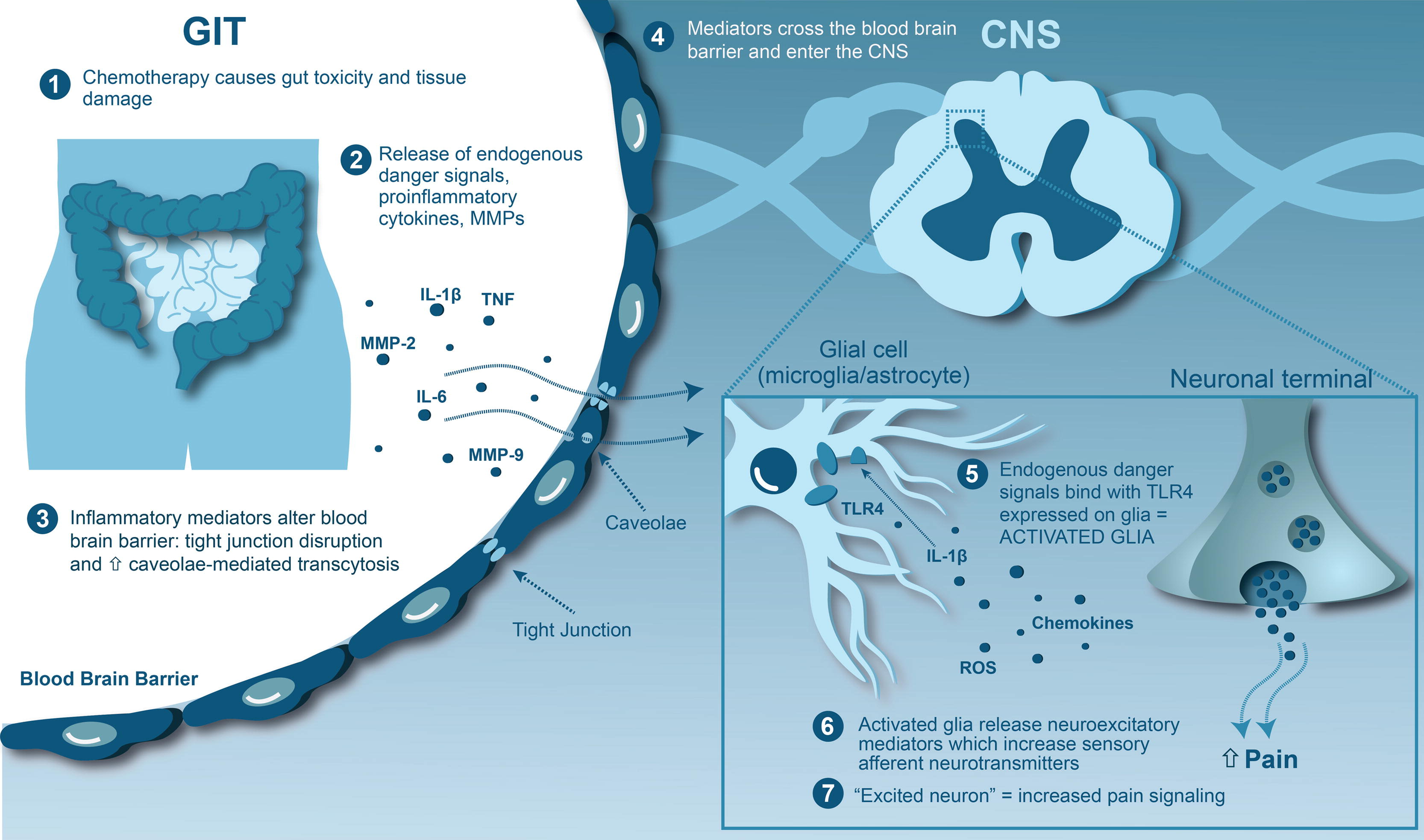
Images: Techniques and pathways under investigation. Top panel - Quantitiative histology; Cell junctional protein analysis; Intestinal physiology underpinning chemotherapy symptoms. Bottom image - Links between gut toxicity and central neuroinflammation (from group postdoc, Hannah Wardill, Cancer Treat Rev 2015)
Research Project 1
Title: Gut microbiome composition as a predictive marker for cancer treatment outcomes
Project description: Patients with cancer are at high risk of microbiome dysbiosis (lack of bacterial diversity and/or overabundance of pathogenic species) due to frequent hospital visits, surgery, chemotherapy and radiation treatment, other medications (notably prophylactic antibiotics), changes in diet, and the presence of cancer itself. Having a diverse gut microbiota is considered protective against chemotherapy-induced infections, and pre-clinical work points to bacterial diversity as a key determinant of tumour response, gastrointestinal toxicity, and neuroinflammation. Thus the objective of this project is to explore links between microbiota, inflammatory responses, and cancer treatment outcomes. Research techniques include mouse models of cancer treated with chemotherapy, bacterial gene sequencing, and a patient trial analysing longitudinal changes in microbiome composition following different cancer therapies.
Projects available for: Honours / HDR
Location: Helen Mayo Building
Research project start: Semester 1 and 2
Special requirements: Nil
Research Project 2
Title: Dietary interventions for protection from chemotherapy-induced bone loss
Project description: Drugs used to treat breast cancer cause damage to normal bone structure, leading to adverse symptoms such as loss of bone mineral density and fractures in survivors. Our group is working with industry to explore different dietary interventions to prevent bone loss following treatment with the chemotherapy drug, methotrexate. This project will use breast cancer rodent cancer models treated with chemotherapy. Research techniques include histological analysis, cell death assays, immunofluorescence, real time PCR and small animal handling.
Projects available for: Third Year / Honours / HDR
Location: Helen Mayo Building
Research project start: Semester 1 and 2
Special requirements: Nil
Research Project 3
Title: The CANnabinoids for CANcer Therapy (CANCAN) Trial
Project description: Medicinal cannabis is being explored as a new treatment for various side effects of cancer treatment. We are conducting a randomised controlled trial in patients with solid tumours who may benefit from a medicinal cannabis product (oral CBD and THC preparations). In addition to measures of effectiveness, the project will explore patient perceptions of the medication, patient-reported outcome measures, and pharmacology of the intervention.
Projects available for: HDR (PhD and M.Phil)
Location: Helen Mayo Building
Research project start: Semester 1 and 2
Special requirements: Nil
-
Appointments
Date Position Institution name 2021 - ongoing Professor University of Adelaide 2017 - 2021 Associate Professor University of Adelaide -
Awards and Achievements
Date Type Title Institution Name Country Amount 2016 Award Telstra Women's Business Public Sector and Academia Award - - - 2014 Award MASCC Young Investigator Award - - - 2009 Award SA Young Tall Poppy Science Award Australian Institute of Policy and Science - - 2009 Fellowship NHMRC Australian-based biomedical research fellowship University of Adelaide Australia - 2008 Award MASCC Young Investigator Award - - - 2007 Award MASCC Young Investigator Award - - - 2006 Award MASCC Young Investigator of the Year - - - 2003 Scholarship Royal Adelaide Hospital Research Committee Dawes Postgraduate Research Scholarship - - - -
Education
Date Institution name Country Title 2010 - 2012 University of Adelaide Australia M.Phil (Clin Sci) 2002 - 2006 University of Adelaide Australia PhD 1997 - 2001 University of Adelaide Australia B. Hlth.Sci (Hons) -
Certifications
Date Title Institution name Country — Grad. Cert. Online Learning (Higher Education) University of Adelaide Australia — Grad. Cert. Public Health Charles Darwin University Australia -
Research Interests
-
Journals
-
Book Chapters
-
Conference Papers
Year Citation 2021 Al-Qadami, G., Bowen, J., Van Sebille, Y., Wardill, H., Secombe, K., & Le, H. (2021). Pre-treatment gut microbiome and radiotherapy response and toxicities among patients with head and neck cancer. In MASCC/ISOO Annual Meeting. 2021 Subramaniam, C. B., Wardill, H. R. R., Gladman, M. A., & Bowen, J. M. (2021). 5-FU induces acute neurodegeneration followed by persistent neuroinflammation: A new mechanistic hypothesis for the neurological complications of cancer therapy. In ASIA-PACIFIC JOURNAL OF CLINICAL ONCOLOGY Vol. 17 (pp. 113). WILEY. 2021 Crame, E., Wardill, H. R., Secombe, K., Coller, J., & Bowen, J. (2021). Intestinal epithelial TLR4 are crucial to chemotherapy toxicity development. In ASIA-PACIFIC JOURNAL OF CLINICAL ONCOLOGY Vol. 17 (pp. 110). WILEY. 2019 Bowen, J. M., Secombe, K. R., Ball, I. A., Shirren, J., Wignall, A. D., Finnie, J. W., . . . Keefe, D. (2019). Budesonide and colesevelam reduce neratinib-induced diarrhea in a rat model. In CANCER RESEARCH Vol. 79 (pp. 2 pages). San Antonio, TX: AMER ASSOC CANCER RESEARCH.
2019 Bruning, E., Coller, J., Wardill, H., Secombe, K., & Bowen, J. (2019). Toll-like receptor 4 humanized C57BL/6 mouse intestinal permeability: A translational model for cancer treatment toxicity. In JOURNAL OF GASTROENTEROLOGY AND HEPATOLOGY Vol. 34 (pp. 166). WILEY. 2018 Wardill, H., Secombe, K., Gibson, R., Stringer, A., Al-Dasooqi, N., Mayo, B., & Bowen, J. (2018). Pre-treatment blautia abundance regulates chemo-toxicity in colorectal cancer patients: A pilot study. In NEUROGASTROENTEROLOGY AND MOTILITY Vol. 30 (pp. 1 page). WILEY. 2018 Hughes, P., Wardill, H., Choo, J., Dmochowska, N., Campaniello, M., Mavrangelos, C., . . . Rogers, G. (2018). Acute colitis chronically alters epithelial barrier and adaptive and innate immune responses to subsequent colitis re-activation independently of shifts in microbiota composition. In NEUROGASTROENTEROLOGY AND MOTILITY Vol. 30 (pp. 1 page). WILEY. 2018 Secombe, K., Bowen, J., Coller, J., Gibson, R., Stringer, A., Al-Dasooqi, N., . . . Wardill, H. R. (2018). Pre-treatment Blautia abundance regulates chemotherapy-induced gastrointestinal toxicity risk: a pilot study. In ASIA-PACIFIC JOURNAL OF CLINICAL ONCOLOGY Vol. 14 (pp. 59). WILEY.
WoS12018 Korver, S. K., Bowen, J. M., Ball, I. A., Gibson, R. J., Tuke, J., Logan, R., . . . Coller, J. K. (2018). Personalised supportive care for patients receiving 5-fluorouracil (5-FU): analysis of multivariate SNP risk prediction for GI toxicity. In ASIA-PACIFIC JOURNAL OF CLINICAL ONCOLOGY Vol. 14 (pp. 58-59). WILEY. 2015 Vanhoecke, B., Mayo, B., Wignall, A., Ziegler, V., Stringer, A., Bateman, E., . . . Keefe, D. (2015). Irinotecan induces DNA damage in the oral cavitiy of the Dark Agouti rats without visual signs of lesions. In Supportive Care in Cancer Vol. 23 (pp. S115). Copenhagen, Denmark: Springer Verlag (Germany).
2015 Wan Mohamad Zain, W., Bowen, J., Bateman, E., & Keefe, D. (2015). Investigation of lapatinib-induced diarrhea in a tumour-bearing rat model. In Supportive Care in Cancer Vol. 23 (pp. S387). Copenhagen, Denmark: Springer Verlag (Germany).
2015 Mayo, B., Stringer, A., Lucchesi, C., Bowen, J., Bateman, E., Wignall, A., . . . Keefe, D. (2015). Microbial alterations and toll-like receptor expression play a role in the improvement of irinotecan-induced mucositis after treatment with the new selective GLP-2 receptor agonist, Elsiglutide. In Supportive Care in Cancer Vol. 23 (pp. S111). Copenhagen, Denmark: Springer Verlag (Germany).
2013 Al-Azri, A. S., Logan, R., Gibson, R., Keefe, D., stringer, A., & Bowen, J. (2013). The role of matrix metalloproteinases and tissue inhibitors of metalloproteinase in irinotecan induced-chemotherapy. In Supportive Care in Cancer. Berlin Genrmany: Springer Verlag (Germany). 2013 Abstracts of the MASCC/ISOO (Multinational Association of Supportive Care in Cancer/International Society of Oral Oncology) International Symposium on Supportive Care in Cancer. June 27-29, 2013. Berlin, Germany. (2013). In Supportive care in cancer : official journal of the Multinational Association of Supportive Care in Cancer Vol. 21 Suppl 1 (pp. S2-301). Germany: Springer Science and Business Media LLC.
Europe PMC22012 Abstracts of the 2012 International MASCC/ISOO (Multiple Association of Supportive Care in Cancer/International Society for Oral Oncology) Symposium. New York City, New York, USA. June 28-30, 2012. (2012). In Supportive care in cancer : official journal of the Multinational Association of Supportive Care in Cancer Vol. 20 Suppl 1 (pp. 1-283). Germany: Springer Science and Business Media LLC.
Europe PMC12010 Al-Dasooqi, N., Bowen, J., Gibson, R., Logan, R., Stringer, A., & Keefe, D. (2010). Irinotecan-induced mucositis encompasses changes in intestinal and colonic cell kinetics and this is associated with altered extracellular matrix component expression. In Abstracts of the 2010 International MASCC/ISOO Symposium Vol. 25 (pp. 0 pages). Vancouver, Canada: Springer-Verlag.
2010 Al-Dasooqi, N., Gibson, R., Bowen, J., Logan, R., Stringer, A., & Keefe, D. (2010). Matrix metalloproteinases play a pivotal role in the development of alimentary tract mucositis. In Sydney Cancer Conference (pp. 0 pages). The University of Sydney, NSW, Australia. 2009 Stringer, A., Gibson, R., Yeoh, A., Bowen, J., Logan, R., & Keefe, D. (2009). CHEMOTHERAPY-INDUCED DIARRHOEA IS ASSOCIATED WITH A MODIFIED MICROBIOME IN GI CANCER PATIENTS. In ANNALS OF ONCOLOGY Vol. 20 (pp. 73). Barcelona, SPAIN: OXFORD UNIV PRESS. 2007 Logan, R., Gibson, R., Stringer, A., Bowen, J., Sonis, S., & Keefe, D. (2007). Serum levels of nuclear factor-κB and tumour necrosis factor following irinotecan administration in the Dark Agouti rat. In ORAL ONCOLOGY (pp. 211). Amsterdam, NETHERLANDS: ELSEVIER SCIENCE BV. 2007 Logan, R., Gibson, R., Stringer, A., Bowen, J., Sonis, S., & Keefe, D. (2007). Nuclear factor-KB and cyclooxygenase-2 expression in the oral mucosa following cancer chemotherapy. In ORAL ONCOLOGY (pp. 171). Amsterdam, NETHERLANDS: ELSEVIER SCIENCE BV. -
Conference Items
Year Citation 2021 Al-Qadami, G., Verma, G., Van Sebille, Y., Le, H., Hewson, I., & Bowen, J. (2021). Antibiotic-induced depletion of gut microbiota reduces injury area and duration of radiation-induced oral mucositis in rats. Poster session presented at the meeting of Abstracts of the MASCC/ISOO Annual Meeting 2021, as published in Supportive Care in Cancer. virtual online: Springer.
2021 Secombe, K. R., Ball, I. A., Wignall, A. D., Bateman, E., Diala, I., Lalani, A. S., & Bowen, J. M. (2021). Antibiotic treatment targeting gram negative bacteria prevents neratinib-induced diarrhea in rats.. Poster session presented at the meeting of CANCER RESEARCH. Philadelphia, PA: AMER ASSOC CANCER RESEARCH. 2020 Al-Qadami, G., Van Sebille, Y., Le, H., Hewson, I., & Bowen, J. (2020). Antibiotic-induced depletion of gut microbiota: Impact on radiation-induced oral mucositis in rats. Poster session presented at the meeting of Federation of Neurogastroenterology & Motility. 2019 Al-Qadami, G., Van Sebille, Y., Le, H., Hewson, I., & Bowen, J. (2019). Antibiotic‐induced depletion of gut microbiota: Impact on radiation‐induced oral mucositis in rats. Poster session presented at the meeting of Clinical Oncology Society of Australia. 2019 Coller, J. K., Korver, S. K., Ball, I. A., Gibson, R. J., Tuke, J., Logan, R. M., . . . Bowen, J. M. (2019). Predictors of severe gastrointestinal toxicity risk in patients treated with 5-fluorouracil-based chemotherapy: A validation study. Poster session presented at the meeting of ASIA-PACIFIC JOURNAL OF CLINICAL ONCOLOGY. WILEY. 2017 Secombe, K. R., Ball, I. A., Shirren, J., Wignall, A. D., Wardill, H. R., Van Sebille, Y. Z. A., & Bowen, J. M. (2017). Budesonide Reduces Neratinib-Induced Gastrointestinal Injury and Diarrhoea in Rats. Poster session presented at the meeting of ASIA-PACIFIC JOURNAL OF CLINICAL ONCOLOGY. WILEY.
WoS22017 Bowen, J., Ball, I., Thompson, S., Irvine, T., Chiam, K., Hussey, D., . . . Keefe, D. (2017). Identification of Inflammatory Markers of Chemoradiotherapy-Induced Gastrointestinal Toxicity in Oesophageal Cancer. Poster session presented at the meeting of ASIA-PACIFIC JOURNAL OF CLINICAL ONCOLOGY. WILEY. 2017 Korver, S. K., Ball, I. A., Gibson, R. J., Logan, R. M., Karapetis, C. S., Keefe, D. M., . . . Coller, J. K. (2017). The Effect of Immune Genetic Variants on Chemotherapy-Induced Gastrointestinal Toxicity (CIGT) Risk in Patients Receiving 5-Fluorouracil. Poster session presented at the meeting of ASIA-PACIFIC JOURNAL OF CLINICAL ONCOLOGY. WILEY. 2017 Korver, S. K., Ball, I. A., Gibson, R. J., Tuke, J., Logan, R. M., Richards, A., . . . Coller, J. K. (2017). Interleukin-1 Beta (<i>IL1B</i>) Genetic Variability is Predictive of Chemotherapy-Induced Gastrointestinal Toxicity (CIGT) Risk in Patients Receiving 5-Fluorouracil. Poster session presented at the meeting of ASIA-PACIFIC JOURNAL OF CLINICAL ONCOLOGY. WILEY. 2017 Wardill, H., Bowen, J., Dmochowska, N., Campaniello, M., Mavrangelos, C., Holloway, R., . . . Hughes, P. (2017). Faecal supernatants from diarrhoea predominant Irritable Bowel Syndrome (IBS) patients disrupt colonic epithelial barrier function and directly activate colo-rectal afferent nerves. Poster session presented at the meeting of Abstracts of the NeuroGASTRO 2017 Congress, as published in Neurogastroenterology and Motility. Cork, Ireland: Wiley.
2017 Wardill, H., Dmochowska, N., Campaniello, M., Mavrangelos, C., Bowen, J., Andrews, J., . . . Hughes, P. (2017). Fecal supernatants from active ulcerative colitis patients impair colonic epithelial barrier integrity and activate pelvic mucosal extrinsic afferent nerves. Poster session presented at the meeting of FASEB Journal. Chicago, IL: Federation of American Societies for Experimental Biology. 2014 Mayo, B., Stringer, A., Bateman, E., Bowen, J., Wignall, A., Wozniak, B., . . . Keefe, D. (2014). Apoptosis, proliferation and inflammation are improved after treatment with the new selective glp-2 receptor agonist, elsiglutide, in a rat model of irinotecan-induced mucositis. Poster session presented at the meeting of Asia-Pacific Journal Of Clinical Oncology. Melbourne, Vic.: Wiley.
2014 Mayo, B., Stringer, A., Bateman, E., Bowen, J., Pietra, C., Cantoreggi, S., & Keefe, D. (2014). Apoptosis, proliferation and inflammation are improved after treatment with the new selective GLP-2 receptor agonist, Elsiglutide, in a rat model of irinotecan-induced mucositis. Poster session presented at the meeting of Supportive Care in Cancer. Miami, USA: Springer Verlag (Germany). 2013 Bateman, E., Wilson, C., Keefe, C., Bowen, J., Wignall, A., Plews, E., & Keefe, D. (2013). Fractionated radiotherapy in a rat model causes dose-dependent changes in collagen deposition, and expression of transforming growth factor β1, Smad3 and smooth muscle actin α1. Poster session presented at the meeting of Supportive Care in Cancer. Berlin, Germany: Springer Verlag (Germany).
2013 Wan Mohamad Zain, W., Bowen, J., Bateman, E., & Keefe, D. (2013). Development of a walker 256-TC tumour-bearing rat model to study lapatinib-induced mucosal injury. Poster session presented at the meeting of Supportive Care in Cancer. Berlin, Germany: Springer Verlag (Germany).
2013 Radzuan, M., Bateman, E., Bowen, J., Keefe, D., & Stringer, A. (2013). Intestinal Lactobacillus spp. increase following radiotherapy in rats: an unusual finding. Poster session presented at the meeting of Supportive Care in Cancer. Berlin, Germany: Springer Verlag (Germany). 2013 Bowen, J., White, I., Tuke, J., Logan, R., Richards, A., Mead, K., . . . Coller, J. (2013). IMMUNE GENETIC VARIABILITY IS ASSOCIATED WITH RISK OF SEVERE GASTROINTESTINAL TOXICITY IN PATIENTS TREATED WITH FLUOROURACIL. Poster session presented at the meeting of ASIA-PACIFIC JOURNAL OF CLINICAL ONCOLOGY. WILEY-BLACKWELL. 2011 Bateman, E., Bowen, J., Mayo, B., Plews, E., Darby, J., Stringer, A., . . . Keefe, D. (2011). Further characterisation of epidermal growth factor receptor (EGFR) tyrosine kinase inhibitor-induced diarrhoea. Poster session presented at the meeting of Abstracts of the 2011 International MASCC/ISOO Symposium, as published in Supportive Care in Cancer. Athens: Springer-Verlag.
2009 Stringer, A. M., Gibson, R. J., Bowen, J. M., Logan, R. M., Al-Dasooqi, N., & Keefe, D. M. K. (2009). Chemotherapy-induced diarrhoea is associated with a modified microbiome in cancer patients. Poster session presented at the meeting of Abstracts of the Australia & New Zealand Medical & Surgical Gastrointestinal Week 2009, as published in Journal of Gastroenterology and Hepatology. Sydney, N.S.W.: Wiley-Blackwell.
-
Theses
Year Citation 2016 Wardill, H. (2016). Toll-like receptor 4-dependent barrier dysfunction and its impact on irinotecan-induced gut toxicity and pain. (PhD Thesis).
Funding
Prof Bowen’s research program has been funded by NHMRC, MRFF, Cancer Council SA, SA Cancer Research Collaborative, Cure Cancer Australia, Australian Dental Research Foundation, the Ray and Shirl Norman Cancer Research Trust, the Royal Adelaide Hospital Research Committee, Flinders University, and University of Adelaide. With her co-investigators, funding received has totalled over $3 Million dollars. Industry has been a major funder and continues to be an area of increasing linkage. Current and previous industry partners include Kallyope (PI), GlaxoSmithKline (CI), Helsinn Healthcare (CI), Pfizer Pharmaceuticals (PI), Puma Biotechnology (PI), Zhendong, Pharmaceuticals (AI), CSIRO (CI), AstraZeneca (CI), Danone (CI) and Pantheryx (CI).
Teaching
In 2011, Prof Bowen was appointed to lecturer in Physiology, University of Adelaide, promoted to senior lecturer in 2015, and then associate professor in 2017, which has provided opportunities to teach and train the next generation of researchers. She teaches within the B.HlthMedSc program, particularly involved in delivery of gastrointestinal physiology content. She was Deputy Chair of the Faculty Gender Equity and Diversity committee (2017-2019) and implements inclusive practices for courses she teaches.
Prof Bowen is the Faculty Honours Coordinator and a Senior Postgraduate Coordinator for the School of Biomedicine. Through these roles she is able to play a leadership role in training the next generation of health and medical science researchers.
-
Current Higher Degree by Research Supervision (University of Adelaide)
Date Role Research Topic Program Degree Type Student Load Student Name 2023 Co-Supervisor Neuropsychological complications of chemotherapy and the involvement of the endocannabinoid system. Doctor of Philosophy Doctorate Full Time Miss Olivia Marie Bellas 2022 Principal Supervisor The microbiome in cancer treatment toxicity in the gut Doctor of Philosophy Doctorate Full Time Mrs Claire Patricia Vieyra 2022 Co-Supervisor Examining bone effects of EGFR-targeting breast cancer treatment Doctor of Philosophy Doctorate Full Time Miss Micaela Jocelyn Quinn 2022 Principal Supervisor Exploring the effect of diet and gut microbiota on breast cancer using the Dark Agouti Mammary Adenocarcinoma (DAMA) model. Doctor of Philosophy Doctorate Full Time Ms Ifeoma Julieth Dikeocha 2021 Co-Supervisor Uncovering novel mechanisms of chemotherapy-induced bone destruction Doctor of Philosophy Doctorate Full Time Mr Bailey Michael Deverell -
Past Higher Degree by Research Supervision (University of Adelaide)
Date Role Research Topic Program Degree Type Student Load Student Name 2021 - 2023 Principal Supervisor An Investigation of Biological Processes Underlying Neratinib-induced Gut Injury Master of Philosophy (Medical Science) Master Full Time Mr Phu Minh Triet Nguyen 2019 - 2023 Principal Supervisor The Microbiota Gut Brain Axis in the Neuropsychological Complications of Chemotherapy Treatment Doctor of Philosophy Doctorate Full Time Miss Courtney Brooke Subramaniam 2019 - 2023 Principal Supervisor The Role of TLR4 in Chemotherapy-Induced Toxicity, Immunity and Tumour Growth Doctor of Philosophy Doctorate Full Time Mrs Elise Ellen Crame 2019 - 2021 Principal Supervisor Exploring the Role of the Gut Microbiome in Toxicity and Response to Radiotherapy for Head and Neck Cancer Doctor of Philosophy Doctorate Full Time Mrs Ghanyah Hamid Hussein Al-Qadami 2018 - 2022 Principal Supervisor Exploring the Effects of Toll-Like Receptor 4 Antagonism on Gastrointestinal Mucositis and Tumour Activity Doctor of Philosophy Doctorate Full Time Miss Shu Yie Janine Tam 2017 - 2021 Principal Supervisor Exploration of the gut microbiome as a predictive factor for cancer treatment-induced gastrointestinal toxicity Doctor of Philosophy Doctorate Full Time Miss Kate Rebecca Secombe 2016 - 2020 Co-Supervisor Identifying potential genetic, phenotypic and epigenetic predictive markers in the Toll-like receptor/Interleukin-1 domain innate immune signalling pathway for severe gastrointestinal toxicity risk following 5-Fluorouracil-based therapy Doctor of Philosophy Doctorate Full Time Miss Samantha Kaitlyn Korver 2016 - 2022 Co-Supervisor Role of Aquaporin 1 in Diseases and Drug Discovery Doctor of Philosophy Doctorate Full Time Mr Pak Hin Chow 2014 - 2017 Principal Supervisor Characterisation and Treatment of Pan-Human Epidermal Receptor Tyrosine Kinase Inhibitor-Induced Gastrointestinal Toxicity Doctor of Philosophy Doctorate Full Time Ysabella Van Sebille 2013 - 2016 Co-Supervisor Toll-Like Receptor 4-Dependent Barrier Dysfunction and its Impact on Irinotecan-Induced Gut Toxicity and Pain Doctor of Philosophy Doctorate Full Time Dr Hannah Rose Wardill 2011 - 2016 Co-Supervisor In vitro and in vivo Models to assess the mechanism of Lapatinib - Induced Diarrhoea Doctor of Philosophy Doctorate Full Time Mrs Wan Nor I'zzah Wan Mohamad Zain 2010 - 2015 Principal Supervisor A Study Linking Toll-like Receptors and Irinotecan-induced Gastrointestinal Mucositis Doctor of Philosophy Doctorate Full Time Mrs Khloud Ghazi Fakiha 2008 - 2012 Co-Supervisor Chemotherapy-Induced Mucositis: The Role of Matrix Metalloproteinases and the Extracellular Matrix Doctor of Philosophy Doctorate Full Time Miss Noor Al-Dasooqi
-
Board Memberships
Date Role Board name Institution name Country 2020 - ongoing Secretary MASCC Executive Board MASCC United States 2018 - ongoing Board Member Multinational Association of Supportive Care in Cancer MASCC United States 2014 - 2017 Director Australian Society for Medical Research Australian Society for Medical Research Australia -
Committee Memberships
Date Role Committee Institution Country 2014 - ongoing Member Multinational Association of Supportive Care in Cancer Governance Committee - - 2008 - ongoing Member South Australian ASMR committee - - -
Editorial Boards
Date Role Editorial Board Name Institution Country 2017 - ongoing Editor Inflammopharmacology Springer Switzerland 2015 - 2018 Editor Gastroenterology Research and Practice Hindawi Publishing Corporation Egypt
Connect With Me
External Profiles




